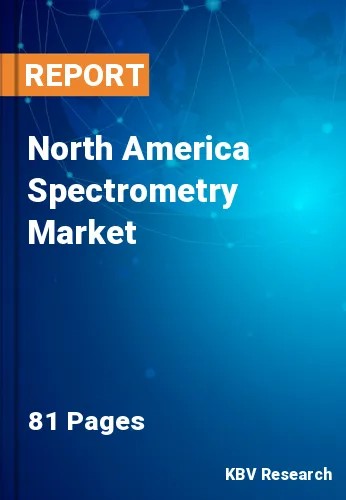The North America Spectrometry Market would witness market growth of 4.4% CAGR during the forecast period (2022-2028).
The distinctive radiation energy and spectra of individual radioisotopes, including - and -emitters, can be used to identify them. The energy spectrum for -emitters is continuous because -particles with energies around zero and the typical maximum energy are released. The rays released by -emitters each have unique energy or energies in the case of radioisotopes that emit several rays.
The recorded pulses are always directly related to the energy scattered in the detector whether scintillation counters are used or proportional counters. Therefore, theoretically, each particular radioisotope can be isolated and counted since the apparatus can be changed to choose and count the relevant section of the pulse height spectrum. As a result, even while a low-energy emitter can mainly be counted without interfering with it, the latter's count will almost always include a portion from the high-energy emitter. It is a little bit simpler to separate -emitters, especially if the -energies are very dissimilar.
Differential mobility spectrometry (DMS) has become an important method for separations in analytical procedures based on mass spectrometry. One can utilize DMS to isolate and quantify isomers, conformers, and even tautomers, frequently with baseline resolution, because of minute variations in ion mobilities under high- and low-field conditions. Chemical modifiers and low partial concentrations of solvent are frequently introduced to the collision gas to facilitate (and occasionally provide) ion separations.
The first was the Alpha Proton X-Ray Spectrometer, which was sent to Mars in late 1996 as part of the Pathfinder mission. The APXS instrument, which was on board both Mars Exploration Rovers when they touched down on the planet in January 2004, was the second. Major institutions participating in the creation of the APXS, in addition to the Canadian Space Agency and NASA, include the University of Guelph, MDA Space Missions, the University of California, San Diego, and Cornell University. The increasing adoption of the spectrometer in NASA and other space missions propels the growth of the spectrometry market in this region.
The US market dominated the North America Spectrometry Market by Country in 2021; thereby, achieving a market value of $4,341.4 million by 2028. The Canada market is experiencing a CAGR of 6.8% during (2022 - 2028). Additionally, The Mexico market would witness a CAGR of 5.9% during (2022 - 2028).
Based on Type, the market is segmented into Molecular Spectrometry, Mass Spectrometry and Atomic Spectrometry. Based on End User, the market is segmented into Pharmaceutical & Biotechnology Companies, Government, Research & Academic Institutions and Others. Based on countries, the market is segmented into U.S., Mexico, Canada, and Rest of North America.
Free Valuable Insights: The Global Spectrometry Market is Predict to reach $15.8 Billion by 2028, at a CAGR of 5.6%
The market research report covers the analysis of key stake holders of the market. Key companies profiled in the report include Thermo Fisher Scientific, Inc., Danaher Corporation, Agilent Technologies, Inc., Shimadzu Corporation, PerkinElmer, Inc., Endress+Hauser AG, LECO Corporation, Waters Corporation, Bruker Corporation and Kore Technology Ltd.
By Type
By End User
By Country
Our team of dedicated experts can provide you with attractive expansion opportunities for your business.

